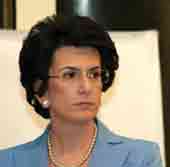Bets being hedged, but the occupation goes on
By David Matsaberidze
Monday, September 8

Burjanadze said that she thought there would at some stage be a military confrontation over South Ossetia and Abkhazia because Russia would be expected fight and send arms and aircraft, adding that “the Georgian people will not consent to being victims of their Government, and, of course, the time will come for a sober assessment of what went wrong in Georgia.” Burjanadze said she hopes that Saakashvili does not feel that he is comfortable in his position or stronger than he was before, as this remained to be seen.
Meanwhile, opposition parties have signed a political charter, a four-paragraph document concerning the agreement of political parties on the fundamental issues of Georgia's territorial integrity, integration into NATO and the establishment of anti-crisis council. Forces from across the political spectrum, from both the ruling party and the opposition, signed the charter. Davit Bakradze, the current Speaker of Parliament who was the first signatory, said it was a very significant document, as it would consolidate political parties after the Russian aggression regardless of their political orientation. He urged every political organization to subscribe to the document.
Georgian special units have begun mine neutralizing works all over Georgia and in Senaki in particular. There are many unexploded Russian bombs in Senaki and the population has been evacuated. Specialists have found 28 bomb sites there so far, at which 45 “loaded bombs” and several 500 kilogramme bombs and 1 tonne bombs dropped by Russian aircraft have been destroyed. The majority of these bombs have been found in residential gardens. Some of them are as deep as 4 metres underground and several bombs have also been found inside houses. Some of the loaded bombs had to be detonated on the spot in controlled explosions, which is why the evacuation of local population was inevitable. The Government has promised to compensate people for damage done to their properties.
The Russians remain active in Georgia, now constructing a military base on the site of the burnt-out patriots' camp in the village of Ganmukhuri, bordering the separatist region of Abkhazia. They are carrying out landscaping and construction materials have already delivered. As the Kremlin is failing to feed its illegally stationed soldiers, the Russians are also robbing the local population. Occupiers who had opened illegal checkpoints in the village of Teklati attacked the local population two nights ago and took away food stored for the winter, dishes and beds. This was allegedly the twelfth fact of robbery since the partial pullout of the Russian Army. Eyewitnesses declare that the offenders are drunk, have razed cornfields and pumpkin fields to the ground and are eating maize and pumpkins raw. The local population is demanding the deployment of international observers and an immediate response from international organizations.
The Russians have also hampered the mission of an MEP travelling in Shida Kartli. The Chairman of the Defence and Security Committee of the European Parliament, Karl von Wogau, was trying to visit the Gori region to observe the villages damaged during the Russian invasion when he was detained at Karaleti. He said he found the Russian soldiers’ explanation of their action unintelligible. After returning from Karaleti, the Euro MP went on to the Gori military base, which has been razed to the ground by the Russians.
Human Rights Watch has released satellite pictures of burnt villages in South Ossetia. The images confirm that ethnic Georgian villages inside South Ossetia were deliberately burned. The satellite images show active fires in five ethnic Georgian villages around the South Ossetian capital, Tskhinvali, on 10, 12, 13, 17, 19 and 22 August, although active hostilities had ended in the area on 10 August, Human Rights Watch says. An analysis by UN experts also showed that the damage was caused by intentional burning rather than armed combat.
HRW researchers have witnessed Ossetian militias looting and burning down ethnic Georgian villages. They say this is evidence of war crimes and urge Russia to prosecute those responsible.
